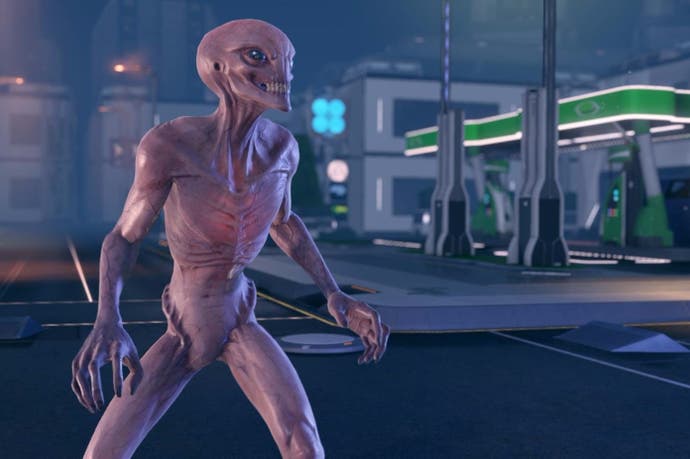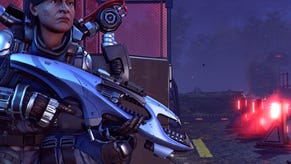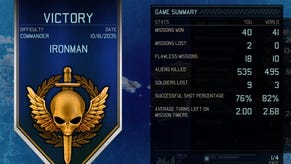XCOM 2 review
The wisdom of Solomon.
XCOM 2 is released on console this week. Here's our review of the PC version, first published on 1st February 2016.
In XCOM: Enemy Unknown, I discovered a tell.
Very occasionally, when you go to take a shot with one of your soldiers, you're treated to a little cinematic camerawork. This being an XCOM game, half the time that means watching your rookie shoot through a wall, or point their gun in some impossible direction. But that doesn't matter! If you see that extra bit of camerawork, you know you'll hit your target. You know you'll be doing damage. More than that, you know you've landed the kill as well. In a game of so very many uncertainties, such moments of guaranteed success are to be treasured.
XCOM 2 appears to offer the same thing, visual glitches and all. You'll line up a shot with one of those dreaded 45 per cent chances to hit, and feel immediate relief as the camera pans round your soldier in slow motion. But here, in this game, that isn't actually telling you anything at all. Despite the build up, your shot might go on to hit, kill, or completely miss its target. If it's the latter, it's a punchline that's been more than three years in the making. This, it turns out, is a sequel that truly understands how people played its predecessor. XCOM has finally recognised its biggest problem: us.
This time around, Firaxis wants us to shine: to take risks, to react smartly but also swiftly - and sometimes, to crack terribly under pressure. The very best examples of this can be found in the way that players are encouraged to move. Whereas Enemy Unknown usually had us terrified to do anything other than tiptoe forwards and overwatch (an ability that prompts soldiers to shoot at enemies that appear during the alien's turn), XCOM 2 thinks you should be a little more adventurous than that. For a start, most missions have some kind of timer to worry about. Rescue/retrieve/destroy the objective in a limited number of turns, or risk failing the mission and losing your reward. Harsher still are the missions that ask you to reach an extraction point with your team within that very same time limit, or watch as your soldiers are left behind. Yeah. I know. It's brutal.
I thought I'd hate this setup, to be honest. The occasional time limit - think bomb disposal missions in Enemy Unknown - doesn't seem so bad, but make them the norm and surely it just feels exhausting? Well, I was wrong. This extra motivation is exactly what the series needed. Combine the added time constraint with a near-infinite pool of map designs (they're procedurally-generated this time around) and you're inevitably going to run into more surprises. You're inevitably going to make more mistakes. And those moments, as you scramble to counter a group of enemies that you weren't quite ready to discover, are when XCOM is at its absolute best.
I'm telling you, after multiple campaigns of Enemy Unknown and Within, it feels such a relief to rely less upon overwatch. At the start of most XCOM 2 missions, this is made possible thanks to concealment, which sees your squad moving around the map temporarily undetected. Stay behind cover and outside of the enemy's reduced line of sight and you can spend your first few turns sneaking closer to an objective. Or you could set up the perfect ambush, thwarting a group of enemies before they even know you're there. That, by the way, is just as satisfying as it sounds.
The idea being that in most missions, the alien forces aren't expecting you to show up in the first place. This sequel is set some 20 years after the events of the previous game, and us humans have well and truly lost the war. The once mighty XCOM have been reduced to little more than freedom fighters in an alien-controlled utopia, which proves a brilliant contrast to Enemy Unknown, in which you started the game with the full support of the world's nations. Here, you begin with nothing, and struggle to build up and support a resistance movement that can eventually, hopefully overthrow its masters.
You manage this, on a tactical front, by moving to and from various objectives on the world map, using your new wicked cool flying alien ship/base of operations. No longer are you limited to reaction, fending off alien attacks, abductions and the fact that India wants to leave the council again. Here you have some control over your targets, as you decide where to spread your influence and which side objectives to pursue. Do you want to fly back to South America to pick up those rookies, or raid an alien convoy in Western Europe? It's your choice, but importantly, you will never be able to do everything. This is XCOM after all; sacrifices have to be made.
The base building itself will look familiar, despite taking place in the belly of an alien supply ship, as you clear out a grid of 'alien debris' and fill it full of the sort of useful things you'd expect: power sources, training schools and the like. But, again, XCOM 2 has adapted to its playerbase. With an increased focus on random outcomes, you're encouraged to react to surprise breakthroughs. The foundry, for example, has your engineers experimenting with the research you've completed: producing weapons, armour and ammunition that you can't quite predict. Although the cross-section presentation looks familiar, there isn't a pre-determined build order to follow here, and it's all the better for it.
Everywhere you look, you see the same kind of micro-surgical thinking. The game is always keen to see you moving promptly, acting before it's too late. The aliens are always up to something and there's always a big, red, doomsday-styled counter ticking away at the top of the screen. Why? Many of us, I expect, were guilty of holding off on assaulting the alien base in Enemy Unknown until we'd finished a few extra research projects, or kitted out our squad in just the way we liked. Despite being repeatedly told how urgently the planet required us to complete that mission, we did a bit of grinding first. It was all-out war, but did we really feel the pressure?
Well, XCOM 2 knows about all our old tricks. Typical. As a result, if you spend too long avoiding your responsibilities and allow the aliens to complete whatever it is that they're plotting, it's game over. You don't just lose, they win. You're going to need to reload an earlier save, or if you're playing on Ironman mode (and you totally should be!), it's time to start from scratch. Even typing that forces a grimace.
Of course, XCOM 2 looks better than Enemy Unknown and it has more enemies. There are new abilities to unlock, weapons to research, and the thin men are now snake ladies with breasts. Great.
But that stuff is relatively simple. Back of the box stuff. Looks good, but does it really make much of a difference? Moment to moment, the thing that makes this astonishing game truly sing is the way in which it's managed to respond to the bad habits we picked up last time around. Move faster, it urges. Take more risks. Become a more interesting player.
XCOM 2 isn't a reworking of the original game, then - it's a genuine response to it. A response to us. Turns out Firaxis was on overwatch all along.












